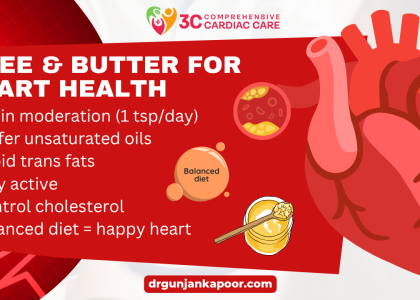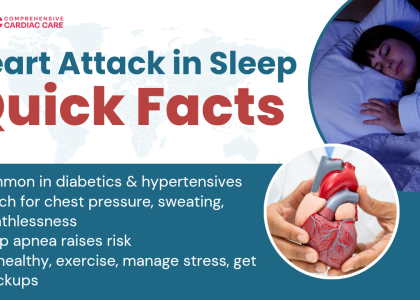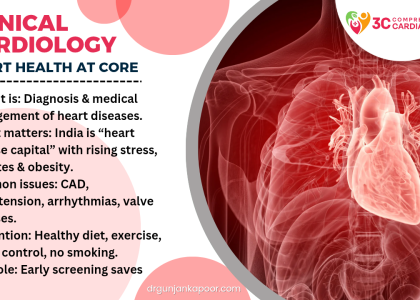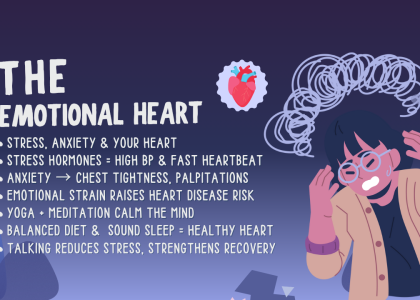Introduction
Heart disease remains the
leading cause of death in India, affecting both urban and rural populations. With lifestyle changes, rising stress, poor diet, diabetes, and hypertension, Indians are developing heart problems at younger ages compared to Western countries. Recognizing early warning signs is crucial—delaying a cardiology visit can sometimes mean the difference between life and death.
This blog explains the
red-flag symptoms that should prompt a visit to a cardiologist, why early detection is vital, and how Indian patients can safeguard their heart health.
Why Early Detection Matters
According to
Clinical Cardiology research, early diagnosis and intervention can significantly reduce the risk of major heart attacks, heart failure, and sudden cardiac death. In India, where heart disease often strikes in the 30s and 40s, awareness is essential. Consulting a cardiologist at the right time not only saves lives but also prevents long-term complications.
Key Symptoms That Require a Cardiologist Visit
1. Chest Pain or Discomfort
- Warning sign: Tightness, heaviness, or pressure in the chest, especially during exertion or stress.
- Why it matters: This may indicate angina or an impending heart attack. Indians often dismiss chest pain as acidity, but ignoring it can be dangerous.
2. Shortness of Breath
- Warning sign: Difficulty breathing while walking, climbing stairs, or lying flat.
- Why it matters: This could suggest heart failure, valve problems, or fluid buildup around the heart. Many patients in India confuse it with asthma or aging, delaying timely care.
3. Palpitations (Irregular or Fast Heartbeat)
- Warning sign: A fluttering, racing, or irregular heartbeat that occurs suddenly or frequently.
- Why it matters: Arrhythmias (abnormal rhythms) can lead to stroke or sudden cardiac arrest if untreated.
4. Swelling in Legs, Ankles, or Feet
- Warning sign: Persistent swelling or puffiness, especially towards the evening.
- Why it matters: This may be a sign of heart failure, where the heart cannot pump blood effectively, causing fluid buildup.
5. Dizziness, Fainting, or Extreme Fatigue
- Warning sign: Feeling faint, weak, or constantly tired without a clear cause.
- Why it matters: Could indicate low blood flow due to heart valve disease, arrhythmias, or weak heart muscle.
6. Family History and Risk Factors
Even if you have
no symptoms, consult a cardiologist if you have:
- A strong family history of heart disease
- Diabetes, hypertension, or high cholesterol
- Obesity or sedentary lifestyle
- Smoking or alcohol overuse
Indians are genetically predisposed to early heart disease, making preventive cardiology visits especially important.
When Is Urgent Action Needed?
Seek
emergency care immediately if you experience:
- Severe chest pain radiating to the arm, neck, or jaw
- Shortness of breath with sweating or nausea
- Sudden fainting or collapse
These may signal a heart attack or life-threatening arrhythmia. In such cases,
calling an ambulance and reaching the nearest hospital immediately is the best step.
How Cardiologists Help
A cardiologist can:
- Perform tests like ECG, echocardiography, stress tests, and angiography
- Prescribe medications to control blood pressure, cholesterol, and rhythm problems
- Offer procedures like stenting, bypass surgery, or pacemaker implantation when needed
- Guide long-term lifestyle changes for heart protection
Indian Perspective
In India, many patients delay seeing a specialist due to fear, cost, or lack of awareness. Unfortunately, this often results in advanced disease by the time they seek help. However, urban centers now offer world-class cardiology care, and even tier-2 and tier-3 cities are developing advanced facilities.
Investing in early cardiology consultation not only improves health but also reduces future hospital expenses.
Prevention Is the Best Strategy
While recognizing red-flag symptoms is vital,
prevention is even better. Indians should focus on:
- Eating a balanced diet rich in fruits, vegetables, and whole grains
- Exercising at least 30 minutes a day
- Regular health check-ups after age 30
- Quitting smoking and reducing alcohol consumption
- Managing stress with yoga and meditation
Conclusion
Your heart often gives early warning signs—listening to them and consulting a cardiologist can save your life. Chest pain, shortness of breath, palpitations, swelling, or unexplained fatigue should never be ignored. With India’s rising heart disease burden, timely cardiology visits are not optional—they are essential for a healthier future.









